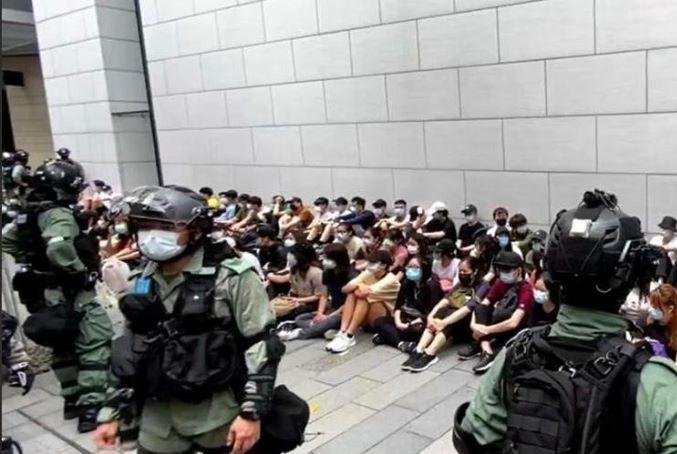Hong Kong: Police arrest 180, fire pepper guns on protesters
by Darryl Coote



May 27 (UPI) -- Police in Hong Kong arrested at least 180 people and fired non-lethal pepper balls at protesters on Wednesday as people took to the streets to demonstrate against a China-proposed national security law critics fear will further strip the semi-autonomous region of its rights and freedoms.
The protests began as lawmakers in the Legislative Council were preparing Wednesday to deliberate on the controversial law that aims to protect China's national security from acts of secession, sedition, subversion and terrorism as well as from foreign influence.
Hong Kong Chief Executive Carrie Lam attempted to quell fears over the law a day earlier, describing it as plugging legal loopholes and saying it will "only target a handful of people."
Police said at least 16 people between the ages of 14 and 40 were arrested before noon Wednesday for allegedly committing illegal acts throughout Hong Kong to disrupt morning traffic.
"Some thugs set fire and threw large debris on the rails of Hong Kong; others ignored the safety of road uses, placed iron nails on the road to pierce car tires and [drivers] deliberately slowed down at the entrance and exit of the Cross-Harbour Tunnel to block traffic," police said on Facebook. "When the police performed preventive anti-crime patrols, they found people had hidden weapons such as petrol bombs and hammers in public."
At least three cars were towed after drivers attempted to participate in the protest by congesting traffic, police said. Two drivers, ages 26 and 40, were arrested for dangerous driving and another 40-year-old driver was arrested for possession of instruments for unlawful purposes after he was found to have a hammer and goggles in his vehicle.
Two male teenagers, ages 15 and 18, were arrested at 6 a.m. and charged with possession of an offensive weapon after they were found carrying several petrol bombs, goggles and helmets, police said.
In Causeway Bay, police arrested a 22-year-old male found in possession of a backpack containing petrol bombs, a lighter and a hammer at around 10 a.m.
"Intelligence suggests that criminals are planning on a series of unlawful activities today," Hong Kong Police said in a statement. "The police are actively reviewing and updating deployments in different districts. Officers will intercept suspicious persons and vehicles to prevent and detect crime."
Activists groups had used social media to call for protests to disrupt the proceedings at the Legco and traffic across the city but the movements mostly failed to materialize under heavy police presence, South China Morning Post reported.
By mid-day, police said officers arrested at least 180 people in Central Hong Kong and Causeway Bay for participating in unauthorized assembly and fired pepper balls into a crowd chanting slogans in the vicinity of Pedder Street, a major thoroughfare in the center of the city.
Police said despite repeated warnings, the protesters refused to leave the scene and some threw garbage cans, traffic cones and other large objects into the roads.
"Some threw water bottles and other objects at police officers, posing a grave threat to road safety," police said in a statement. "The police have no other alternative but to deploy the minimum necessary force, including pepper ball gun, to stop the violent and unlawful acts."
Prominent activist Joshua Wong called on the international community on Wednesday to punish China if it scraps its promise to uphold Hong Kong's high degree of autonomy, which it made in the Sino-British Joint Declaration that returned the city to Chinese rule in 1997.
"I call upon the EU foreign ministers to have a firmer stance on the issue and to urge China to halt the national security legislation," he tweeted. "I urge the EU to impose all necessary sanctions if China insists on breaking a U.N.-filed treaty and finally passes this evil bill."
In a second series of tweets, Wong said in a worst-case scenario if the law passes, Hong Kong will fall under Beijing's direct rule and become another de facto city of China.
"To safeguard the city's freedoms and urge China to stop further misconduct, world leaders, not only the U.S., should consider sanctions on China as the only effective strategic option to send a warning signal to Beijing," he said, calling for not only personal sanctions but sanctions on China Communist Party companies and entities.
White House Press Secretary Kayleigh McEnany told reporters in Washington, D.C., on Tuesday said President Donald Trump was "displeased" with China over its law and that "it's hard to see how Hong Kong can remain a financial hub if China takes over."
Asked what his administration plans to do, Trump told reporters he will talk about the U.S. response "over the next couple of days."
"We're doing something now," he said. "I think you'll find it very interesting, but I won't be talking about it today."
Following the announcement of the legislation, U.S. Secretary Mike Pompeo described it as "a death knell" for the high degree of autonomy Hong Kong was promised in the U.N.-filed declaration.
Earlier, he said the State Department has held off on submitting a Congress-mandated annual report on the autonomy of Hong Kong to see what would transpire this week during China's National People's Congress. The report will determine if Hong Kong's autonomy from Beijing warrants its current special U.S. trade status.
"The United States strongly urges Beijing to reconsider its disastrous proposal, abide by its international obligations and respect Hong Kong's high degree of autonomy, democratic institutions and civil liberties, which are key to preserving its special status under U.S. law," he said in a statement. "We stand with the people of Hong Kong."
Following the law's announcement late last week, Hong Kong residents returned to the streets for the first time in months. The semi-autonomous city has been rocked by pro-democracy protests since last June but protests had simmered due to the pandemic.
Continue Reading